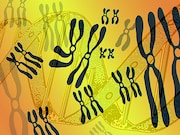Performance of cfDNA test for trisomy 21 in twin pregnancies is similar to that in singleton pregnancies
FRIDAY, June 7, 2019 (HealthDay News) — Performance of cell-free DNA (cfDNA) testing for trisomy 21 in twin pregnancies is similar to that reported in singleton pregnancies, according to research published online June 4 in Ultrasound in Obstetrics & Gynecology.
María del Mar Gil, Ph.D., from the Fetal Medicine Research Institute at King’s College Hospital in London, and colleagues reported routine clinical implementation of cfDNA analysis of maternal blood for trisomies 21, 18, and 13 in twin pregnancy. Data were derived from screening in twin pregnancies at 10+0 to 14+1 weeks of gestation in two populations. These data were combined with those from seven studies on clinical validation or implementation of maternal cfDNA testing for trisomies 21, 18, and 13 in a meta-analysis.
The researchers included 997 twin pregnancies with a cfDNA result and known outcome. Testing correctly classified 16 of 17 cases of trisomy 21, nine of 10 cases of trisomy 18, one of two cases of trisomy 13, and 962 of 968 cases without any of these trisomies. In the combined population meta-analysis, the pooled weighted detection rate (DR) and false-positive rate (FPR) were 98.2 and 0.05 percent, respectively, for trisomy-21 pregnancies; 88.9 and 0.03 percent, respectively, for trisomy-18 pregnancies; and 66.7 and 0.19 percent, respectively, for trisomy-13 pregnancies (two of three affected cases were detected).
“The number of cases of trisomies 18 and 13 was too small for accurate assessment of predictive performance of the cfDNA test,” the authors write.
Copyright © 2019 HealthDay. All rights reserved.








